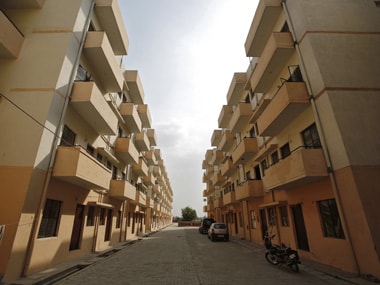Faced with severe concerns that a Donald Trump win in the US election could result in policy uncertainty, world equity markets, including India’s Sensex and Nifty, went into a tailspin earlier in the day. Even as broad market sentiment improved significantly thereafter after Trump was declared the next US president, there was little consolation for the badly hammered real estate sector. [caption id=“attachment_2540176” align=“alignleft” width=“380”]  Reuters[/caption] The reason: investors feared that the overnight decision by the government to demonetise Rs 500 and Rs 1000 currency denomination from the system starting today would hit the real industry hard because of the perception that the sector holds huge amount of black money. “This is just the beginning of a much bigger pain to be seen in the real estate sector as a lot of black money transaction takes place. With the government’s decision to ban the bigger denomination currency from the market, lot of black money will be sucked out of the system. This will lead to a sharp fall in demand for housing property further hurting the industry. However, the move will be positive for the sector after next 2-3 years as property prices will be realistic and more legitimate transactions will happen then,” said G Chokkalingam, Founder & Managing Director, Equinomics Research & Advisory For long, the country’s real estate has been notoriously known as the den of black money hub where cash transactions take place with least amount of accountability. And after Tuesday’s decision when Prime Minister Narendra Modi decided to crack a whip on the black money menace and flush out fake currencies from the system, panic set in amongst the investors triggering widespread selling across the real estate counters. As selling continued unabated during intra-day trade, the BSE Realty index underperformed the markets, tanking 16.5 percent to a low of 1232.23 while the Sensex dropped 6 percent. Among the biggest laggards in realty space, shares of Indiabulls Real Estate tanked 18 percent, DLF also plunged 18 percent, HDIL tumbled nearly 17 percent, Oberoi Realty shed 11 percent and Unitech was down 6 percent. Others such as NBCC, Sobha Developers, Godrej Properties, Omaxe and Phoenix were down around 1-6 percent each. However, select real estate entities ruled out the government’s black money eradication move would hurt the sector’s prospects. In fact, most of them have welcomed the move, saying it will bring in more transparency among the realty companies. “I would say this is one of the best and boldest move taken by the government, and this will continue to have a positive impact on the real estate sector going in the long run. There has been a perception in the markets that lot of cash transaction take place from the builder side which is completely false,” said Shailesh Puranik, managing director, Puranik Builders. In the current scenario, more than 80 percent of the property cost is funded by banks, and even the land cost and other things are being funded through legitimate means like financial institutions etc. Even for the organised sector today, banks are willing to fund the project, as the sector offers a lot of collateral, said Puranik. “There might by cash dealings happening in a second sale or resale of a property, but otherwise most of the transactions are today well funded by banks. Days of unheard valuations are a thing of past and today with several new rules in place, the real estate sector will thrive in coming years. Already, inventory levels are showing a marked improvement in several parts of the country…with real estate bill getting passed and a regulator to be in place soon, it is a big positive for the sector,” added Puranik. In order to give a boost to the sector, the government in March had passed the real estate regulatory bill in the parliament, to bring in clarity for both buyers and developers. “The broader effects of this move will help the sector grow in the long run. Firstly, it will create a level playing field amongst all stake holders in the sector. Institutional funding to developers which till present day came with a higher risk weightage is bound to see some softening with the increased transparency. Prices coming down to more reasonable levels in the residential property market cannot be ruled out," said Shishir Baijal, Chairman & Managing Director, Knight Frank India. In the immediate future, the sector will be under serious pressure with volume and number of transactions in residential and land markets seeing a substantial downward trend. While it cannot be denied that the impact of this move will be felt in primary markets, secondary markets along with tier-II and tier-III cities will also take a hit. However, RERA and this recent move will prove to be a game changer for this sector and next year this time the real estate sector will be a totally different industry – a more evolved, transparent and a corporatized one!” said Baijal.
Investors feared that the overnight decision by the government to demonetise Rs 500 and Rs 1000 currency denomination from the system starting today would hit the real industry hard
Advertisement
End of Article


)

)
)
)
)
)
)
)
)



